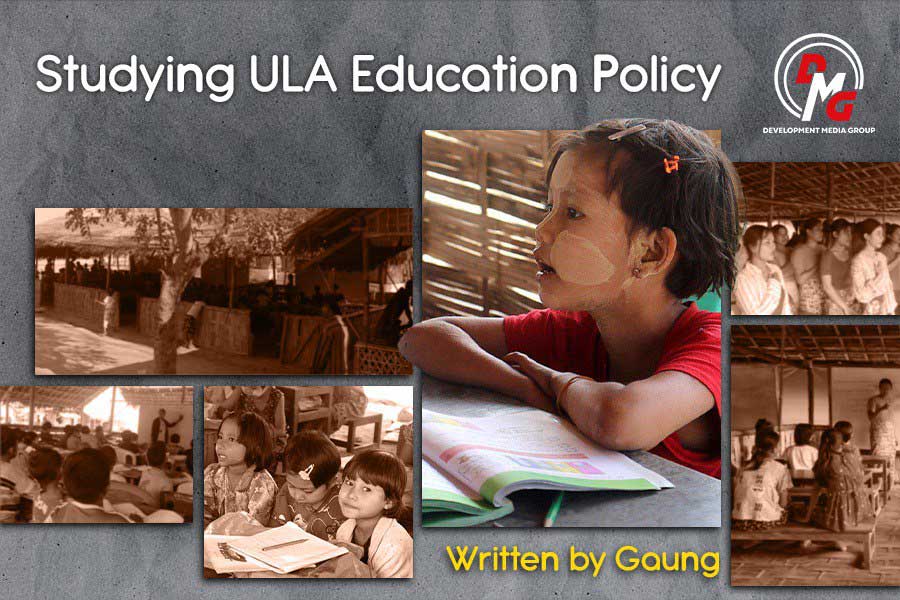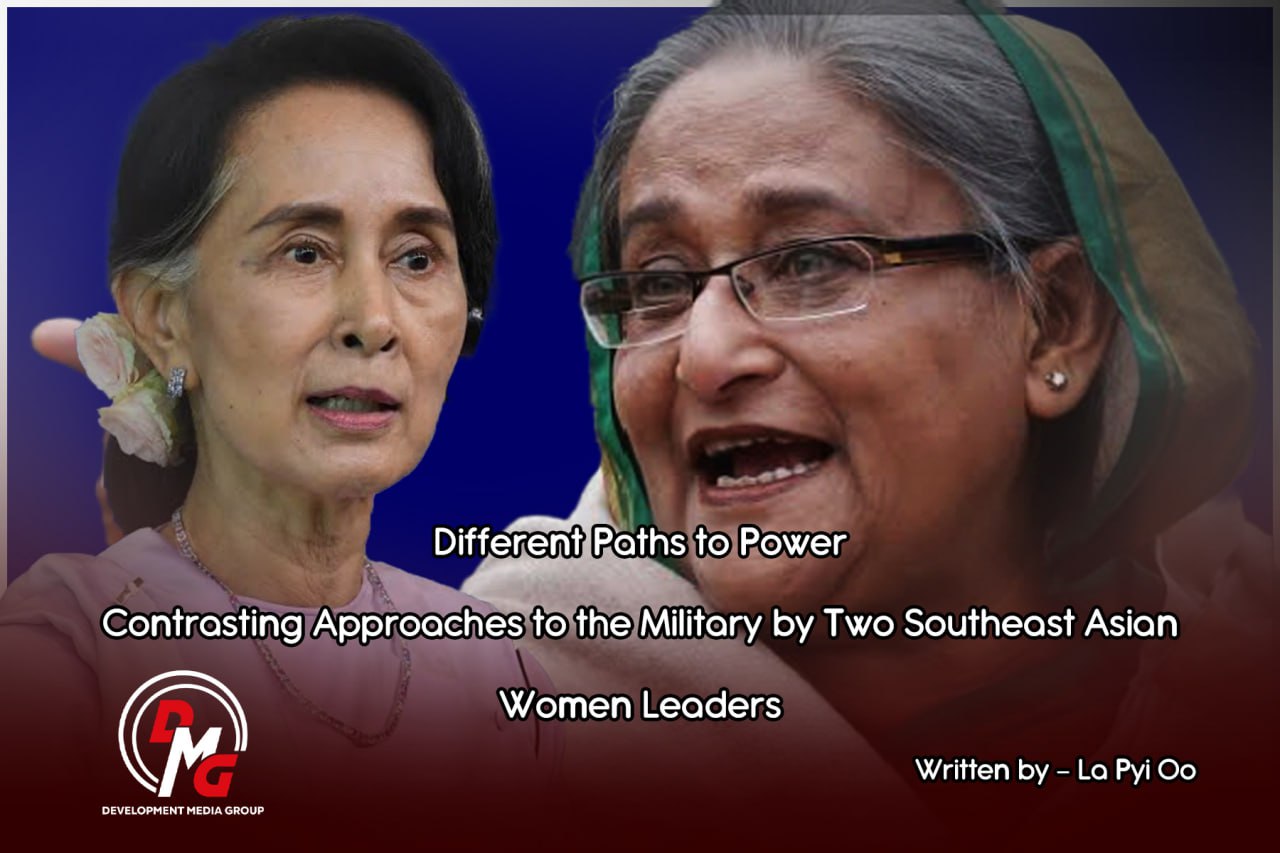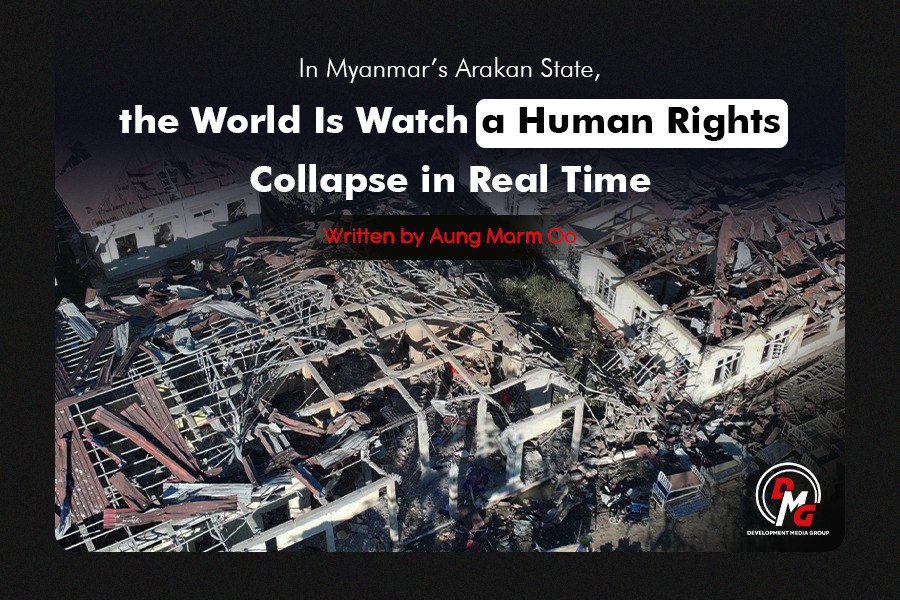- Residents in AA-held areas face new restrictions on travel outside Arakan State
- Natural fertilizer gains popularity among farmers in Arakan State
- Cut Off and in the Dark: How Communications Blackouts Are Deepening Human Suffering in Arakan
- ULA Health Department urges pharmacy owners to apply for drug sale, import licences
- Betel leaf cultivation booms in Arakan State amid rising prices
Studying ULA Education Policy
Myanmar's education system has suffered a major setback since the coup. Myanmar's military regime has targeted schools across the country with airstrikes, citing war as the reason, and children's educational aspirations have been dashed amid insecurity.
30 Aug 2025

Written by Gaung
Myanmar's education system has suffered a major setback since the coup. Myanmar's military regime has targeted schools across the country with airstrikes, citing war as the reason, and children's educational aspirations have been dashed amid insecurity.
In Arakan State, the education sector has also been severely affected, causing many children to lose their right to education and prospects for the future, and schools have been closed in most areas.
The current opening of schools and the Arakkha national education policy are also of interest. Similarly, the normalisation of the educational goals of children in Arakan State continues to face various challenges.
"I have taken the university entrance exam and I want to pass. I want to live a decent life with a decent job. Right now, the situation is not at all certain," Ma May Wati Soe, who took the Grade 12 exam, confided.
Ma May Wati Soe is a 20-year-old high school student from a village in Kyauktaw Township, which is controlled by the Arakan Army (AA).
She is feeling discouraged because the results of the 2024-2025 university entrance examination, which was conducted by the Department of Education under the United League of Arakan (ULA), are still unknown.
Ma May Wati Soe's education path was disrupted by the military conflict. She was unable to sit for the 2023-2024 university entrance exam during the intense battles for control of towns in Arakan State. She also had to take a two-year break during the Covid-19 pandemic and has not completed her high school education even though she is now 20 years old.
"Even if I pass Grade 12, I won't be able to go to a university. What kind of university will there be after I pass Grade 12? I want to know if there is any hope for me," she said.
Formation of the Arakkha National Education Department
The Arakan Army (AA) controls more than 90 percent of Arakan State. At the same time, the Arakan people's government has established departments for administration, judiciary, and public service, strengthening Arakan State in all sectors including education, where it has also been working to ensure normal operation since September 2024.
Now the Arakkha National Education Department has been established. It is divided into central education, district education, township education, and ward/rural education steering committees. The Arakkha National Education Department has also established an examination supervision committee, an examination department office, and township examination teams. The Arakkha National Education Department is affiliated with the Department of Research and Curriculum Development. It also includes the Department of Basic Education, the Department of Higher Education, the Department of Teacher Training, and the Department of Examinations.
"As far as I know, the state-level education department structure has an education officer and a local officer. There are also district education officers. In townships, there are township education committees," a man who monitors education in Arakan State told DMG.
Similarly, there are central education committees at the district, township, and village levels. The work of the village education committee is responsible for the regular operation of the school, teacher accommodation and assignments, and financial matters.
Challenges Ahead
Although efforts are being made to ensure that basic education is not lost in most townships controlled by the Arakan Army, challenges remain. The main challenges are funding and the need for human resources such as teachers, office staff, and education experts.
The Arakkha National Education Department has already recruited about 60 percent of the local teachers it will need, according to the education community. The remaining teachers and education staff are still unable to enter the classrooms for various reasons.
"It started with teachers wanting to join the ULA. The teachers went on their own initiative, saying it was for the national interest. The teachers had to go back to the school where they were originally assigned," said a senior assistant teacher working at the Arakkha National Education Department.
However, there is a shortage of teachers and their qualifications are not up to par. Volunteer teachers are being recruited by the Arakkha National Education Department. Currently, primary school teachers are being replaced by middle school teachers, middle school teachers are being replaced by high school teachers, and so on.
The senior assistant teacher pointed out that there is a need for refresher courses and other training for all teachers. Also, during the fighting, the military regime ordered teachers from Arakan State to transfer to Ayeyarwady Region. As a result, some teachers from Arakan State have moved away.
Teachers are using the virtual classroom system in emergency situations, teaching in groups, and at separate times in homes and safe places.
"This is a Home Basic Learning system. It's not a school-based system, it is Public Home Basic, we have to act accordingly because of the emergency," a high school teacher explained.
The Arakkha people's government is currently unable to pay the salaries of education workers, so it collects tuition fees from students to pay teachers' salaries. The basic cost of a student's education varies from village to village and town to town. The smaller the village and the fewer students, the higher the cost of education per pupil. On average, a primary school student pays K20,000 per month in school fees, a middle school student pays K30,000 or more, and a high school student pays K50,000 or more, according to parents. There are also schools that charge higher tuition fees.
Teachers in large schools earn a monthly salary of K400,000 to 800,000, and in private schools, up to K1 million, while some teachers in remote areas earn a stipend of around K200,000.
"The village education committee negotiates and pays teachers' salaries," said a female teacher in Ponnagyun Township. "Each teacher earns around K200,000. Some villages have a tuition system, while others don't. The ULA has not yet provided budget funds."
The Dream of Arakkha National University
Higher education for students remains uncertain. Students who graduated from university before the ULA took over, those who have not yet graduated, correspondence students and day students are also in a state of uncertainty.
There are also questions about how the Arakkha National Education Department plans higher education for students who pass the Grade 12 exam.
"The Arakkha National Education Department has developed short-term and long-term plans, educational policies, and quality curricula to develop a modern education system that is equitable and responsive to the country's needs," said U Khaing Thukha, spokesman for the AA, at an online press conference on August 12.
He said the Arakkha National Education Department is also trying to create a modern education system and curricula for basic education students and higher education university students. He continued that the Arakkha National Education Department's examination board examined more than 7,800 students for the Grade 12 exam in the academic year 2023-24.
"We are planning to provide higher university education opportunities soon for students who have completed basic education," U Khaing Thukha said.
However, the plan to open a higher education institution is not as simple as it seems. Locals believe that the current 12th grade students are still in an uncertain situation due to the time and money required to build a university.
Therefore, parents and education observers say that emergency policies should be put in place to ensure interim education.
"The ULA is currently trying to establish a university. But the results of the last academic year's Grade 12 exam are not yet out. It is known that the ULA calls those who passed with distinction. The rest of the children are worried that they will fail the exam or become useless," said a parent of a Grade 12 student from Ponnagyun.
Education is a dynamic process and must be taught according to the times and ages. Similarly, curriculum development for higher education will require a wide range of local and international experts.
The parent of the Grade 12 student continued, "So if a university cannot be opened in Arakan State for the next three years, it will not be easy for the current and future students. They may grow up and end up outside of school."
Similarly, parents say that university students who have not graduated in the past are currently feeling uncertain about their future due to various distractions.
Curriculum and Teaching System
According to U Khaing Thukha, the Arakan National Education Department has developed the Arakan curriculum framework up to Grade 7 and is continuing to develop curricula for other grades with experts.
The Arakan National Education Department's subject teaching model is the Public Based Education Programme.
Currently, the Myanmar Basic Education Curriculum is being taught. However, teachers say there has been a change in the main history subject. Currently, Myanmar history has been abandoned and Arakan history is being taught in its place. This means rejecting passages or lessons that praise the Burmese military dictatorship.
"In the history subject, the Burmese kings Anawrahta and Kyansithat have been replaced by passages about Arakan kings Sandar Thuriya, Min Htee, Min Bar Gyi and Min Saw Mon. The history subject no longer includes information about Burmese military dictators. And the terminology has changed," said a primary school teacher working at the Arakan National Education Department.
The Arakan history curriculum includes topics such as the Dwarawady, Danyawady, Waithali, Laymyo and Mrauk-U periods and the kings who ruled them. It will include ancient Arakan capitals, their associated culture and history.
Similarly, the curriculum is being developed to incorporate the national characteristics, traditional culture, and historical aspects of all ethnic groups in Arakan State.
The Arakan National Education Department's Examination Supervision Committee also sets the questions and marks the exams themselves, and students are given 8 grades, such as O, S, E, etc., with no fail system.
Those Forced to Leave the Classroom
The prices of basic education textbooks in Arakan State range from K25,000 to K35,000 for a set of kindergarten textbooks; K35,000 to K50,000 for Grades 1, 2 and 3; K40,000 to K65,000 for Grades 4 and 5; K50,000 to K70,000 for Grades 6, 7, 8 and 9; and K80,000 to K100,000 for Grades 10, 11 and 12.
The prices of other blank books, pencils, and school supplies have also risen, keeping displaced children away from the classroom because they cannot afford them.
"I have three children. The eldest child is in Grade 11 and the two younger ones are in Grade 5 and Grade 7, so the prices of textbooks are so high that I can't afford them. I looked for old textbooks and couldn't afford them, so I had to take the oldest child out of school to work," said Daw Cho Cho Than, an IDP woman in Mrauk-U Township.
During the 2019-2022 conflict in Arakan State, many children dropped out of school due to school closures, displacement, security concerns, and family needs. Although there are free schools in some townships in Arakan State, many children are still unable to attend school due to food insecurity and other issues.
Children across Myanmar have been severely deprived of education since the 2021 coup, with around 7 million, or 53 percent, of this year's school-age population out of school, the Institute for Strategy and Policy - Myanmar (ISP-Myanmar) said in a report on August 6.
The number of people taking the university entrance exam is also continuing to decline, from over 900,000 in 2020 to around 200,000 in 2025.
"The country suffers for the children who have to go to school. The importance of a new educated generation is key in establishing a new Arakan State," said an official from an Arakan civil society organisation.
According to the 2022 Arakan State Education Officer's Office, there were over 3,100 schools in Arakan State, including over 480 basic education high schools, 1,171 middle schools, and 1,530 primary schools.
According to data from the Arakan State Education Officer's Office, 19,729 out of 41,757 students who sat for the 2021-2022 matriculation examination in Arakan State passed; 9,964 out of 16,928 students in the 2022-2023 academic year passed; 5,253 out of 18,934 students in the 2023-2024 academic year passed; and 550 out of 1,564 students in the 2024-2025 academic year passed. Looking at these figures, it can be noted that the number of students in Arakan State is decreasing every year.
The education community believes that the current shortage of education in Arakan State and the young students who have left for abroad for various reasons and are struggling to make ends meet will weaken the future of Arakan State.
Needing the Right People in the Right Places
Schools in Arakan State are said to lack a clear and concise education policy. They also need policies to work step by step, and guidelines that are relevant to the ground. It is not known whether policies have been formulated on compulsory primary education, education for the poor, education support, and education development plans for five and 10 years.
"We still need qualified teachers to attend school regularly. I believe that education will be fully developed only if we can attract them," said a person who monitors the education system in Arakan State.
There are still many qualified and experienced teachers in Arakan State.
"The main problem is that outsiders are taking over ULA's education. The participation rate of genuine, experienced academics is still low. This means that experienced and qualified teachers are not getting seats in Arakan State's education. Even though they want to join, it means that outsiders are dominating education," said a person involved in the Arakan National Education Department.
The term "outsider" refers to people who teach English and computer courses but are not actual teachers.
"In order to systematically formulate policies to implement educational issues, especially in education, today's education should not be led by a single person and done by whim, but rather a discussion involving all experts from all walks of life should be held and an Arakkha National Education Policy should be established," suggested a person involved in education in Arakan State.
University Entrance Exam Lesson
The Grade 12 exam for the 2024-2025 academic year, administered by the Arakan National Education Department, was held in April.
The problem with this exam is that students are notified two days before the exam. They say they were unsure beforehand, and the students did not study the material well. Many students said that they were not able to take the exam because they had to go to the exam without being informed in advance.
The students who took the exam are now telling DMG that most of the students are likely to fail. Therefore, they say that their future access to university education will be limited. On the other hand, these students are not yet qualified to enter the departments and private sector in Arakan State.
"Education is the foundation of a country, so it cannot be a piecemeal process. Now, everyone is talking about education. It is time to systematically implement a clear policy and present it to the people," said a person who monitors the education system in Arakan State.
Ma May Wati Soe is curious about Arakan State's education path, including plans for qualified and relevant universities and other training institutions.
"To be honest, if I fail the 12th grade exam, I won't be able to continue my education. I'm too old. The school has been closed for years," she said.
The people are demanding that the Arakkha people's government present a clear education policy for the future of the national education sector so that the people can understand it.
If we say that "education is the way out of poverty," then we must improve poverty-stricken Arakan State through education under the current Arakkha people's government and establish a dignified Arakan society through education.




.jpg)















